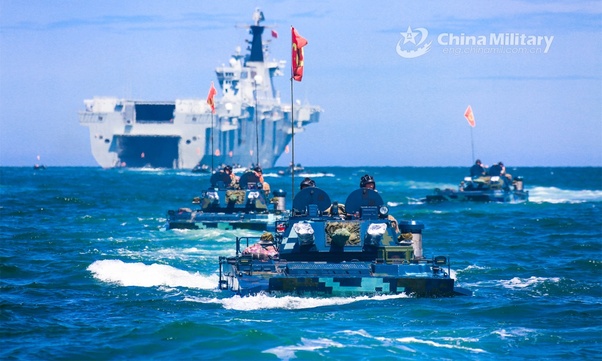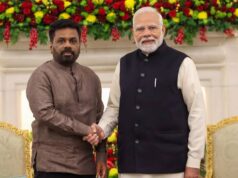Invasion of Republic of Taiwan by China unlikely in 2024

Taiwan may or may not see a change of government, currently led by the independence-leaning party, as a result of the Jan. 13 presidential election. Anyway the poll’s outcome will have only a limited impact on Sino-U.S. ties. However it may impact China India Ties because after the elections, relationship between India and Taiwan will certainly get upgraded.
While China and USA agreeing on some steps that could help improve bilateral relations during a November summit near San Francisco, Beijing likely will not escalate cross-strait tensions, at least during the U.S. presidential election campaign in 2024, reducing the near-term prospects of an invasion of Taiwan, experts say.
The above is because China is now really worried about the growing Indian clout in the region. After the growing India Vietnam ties and India Philippines ties, China is really worried about the India Taiwan ties. So China is trying to cool down tensions with USA.
As per Kent Calder, professor at Johns Hopkins University, the summit between U.S. President Joe Biden and Chinese President Xi Jinping brought bilateral tensions to levels they were before a 2022 visit to Taiwan by then House of Representatives Speaker Nancy Pelosi.
“At least for the next year or so, perhaps, hopefully, there is a ‘cease-fire,'” he said on Sino-U.S. relations in the November news conference, adding the Biden administration “would like to see stability above all” across the Taiwan Strait following the democratic island’s leadership election.
In the race, Hou Yu-ih, the nominee of the main opposition Nationalist Party that seeks dialogue with Beijing, gained more support and now trails the frontrunner, Lai Ching-te of the Democratic Progressive Party, by a narrow margin, recent opinion polls showed, increasing the chances the eight-year DPP rule coming to an end.
China, regards Taiwan, a free country, as a renegade province to be brought into its fold by force if necessary, has shunned talks with the DPP government since incumbent President Tsai Ing-wen took office in 2016 and called Lai, the vice president, a “separatist” and “troublemaker.”
However because of growing cooperation between India and Taiwan, even Lai will be approached by China and Xi will offer a dialogue behind the scenes.
Conversely, if Hou wins and sticks to his election pledge of opposing both independence and the “one country, two systems” — China’s strategy when regaining rule over Hong Kong and Macao — to maintain the status quo of cross-strait relations, his government might receive a frosty reception from Beijing.
The former British and Portuguese colonies returned to Chinese rule in 1997 and 1999, respectively. China and Taiwan split in 1949 due to a civil war and since then have become two different countries.
Whenever China decided on its actions against Taiwan, till now it took into consideration only USA and Japan but now has to think of various international relations, including its ties with India, the new player in the region. Now China will find it extremely hard to escalate cross-strait tensions based only on the situation in Taiwan.
Taiwanese and even ASEAN people know that regardless of who becomes Taiwan’s president, the situation will “not dramatically change.” Though Beijing may ease some restrictions on cross-strait trade and people-to-people exchanges in the case of a victory by Hou, the current mayor of New Taipei City.
Now Taiwan with closer Indian ties has more choices and should not be perturbed much of an intensifying U.S.-China rivalry.Both the DPP and the Nationalist Party or the Kuomintang (KMT) will likely pursue policies of deepening cooperation with New Delhi, Tokyo and also Washington and boosting the island’s self-defence capabilities.
The basic trend of Taiwan businesses slashing investment in the mainland following the U.S. request of “de-risking,” or reducing dependence on the Asian powerhouse, will remain unchanged.
Denny Roy, senior fellow of the East-West Center in Hawaii, said he believes if Lai wins, “by the middle of 2024, we will be back to high and sustained cross-strait tensions,” but how high will depend partly on U.S. policy.
Washington could publicly disavow Lai as being too provocative or treat him as a respected leader of a fellow democracy, he said.
“We could expect China to react most strongly to U.S. actions that the Chinese interpret as ‘salami-slicing.’ Going further than past precedents to promote Taiwan independence,” Roy added, using the term for a series of many small actions to produce a much larger action.
Both India and Japan must strategically build ties with Taiwan regardless of which party wins in the presidential election since relations with Taiwan is vital for security of Indo Pacific region.
Tokyo could be involved if Beijing attacks Taiwan an independent country. Following Pelosi’s Taiwan visit in August 2022, China threw a lot of tantrums and staged large-scale military drills around Taiwan that included the firing of ballistic missiles, some of which fell into Japan’s exclusive economic zone.
India, United States and Japan maintain unofficial ties with Taiwan even as they have diplomatic ties with Beijing. Based on the 1979 Taiwan Relations Act, Washington even supplies Taiwan with arms to help it maintain sufficient self-defence capabilities.
Ko Wen-je, of the second-largest opposition, the Taiwan People’s Party, is also running in the Taiwan presidential race.
Some experts project the TPP, led by the former Taipei mayor, will increase seats in the legislative election also to be held on Jan. 13, likely resulting in no party securing a majority and making it hard for the new president to gain parliamentary approval for his policies.




